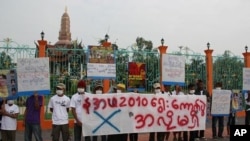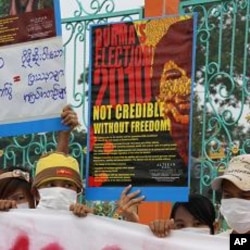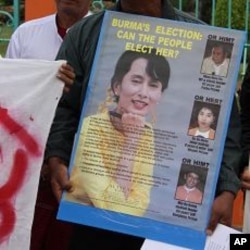Voting has ended in military-ruled Burma's first elections in two decades. Critics say the results were engineered long ago. The military is widely expected to remain in power, though some analysts say the polls could allow for gradual progress. Outside journalists are banned from Burma.
Burma's elections Sunday were held under tight security and as part of what the military government says is a plan to restore democracy after five decades of military rule.
It is not clear when results will be announced.
But, critics say they will not make a big difference as the military has already ensured it will stay in power.
The military-drafted constitution gives it 25 percent of seats in parliament, even before votes are counted.
And the two largest parties, the Union Solidarity and Development Party and the National Unity Party, support the military.
A group of protesters demonstrated against the elections Sunday on the side of a busy highway in Mae Sot, Thailand, on the border with Burma.
Zaw Htunn is one of the protest organizers.
He says the elections held by what he calls the repressive regime are absolutely unfair and not free. He says the protesters totally reject the results because the USDP is led and controlled by military generals who recently exchanged their military uniforms for civilian suits.
The National League for Democracy boycotted the elections because of unfair rules. The military disbanded the party because of the boycott.
The NLD won Burma's last elections in 1990, but the military ignored the results and locked up its leader Aung San Suu Kyi.
A splinter party of the NLD, the National Democratic Force, and more than 30 smaller parties, took part in the elections but contested only a fraction of available seats.
They consider the elections a sham and some complain of widespread voter fraud and intimidation.
Those parties, and some analysts, say that despite the façade of democracy, the elections could still bring about positive change in Burma.
Thitinan Pongsudhirak is director of the Institute of Security and International Studies at Thailand's Chulalongkorn University.
"It used to be a vibrant democracy in the 1950s, it was the leading country in Southeast Asia," Thitinan said. "So, a lot more than elections will have to happen. But, the last two decades, going back to five decades, has indicated to us that the status quo is also not desirable."
United States President Barak Obama Sunday called the elections neither free nor fair.
Speaking in Mumbai, India, during the first leg of a 10-day tour of Asia, Mr. Obama said the Burmese poll demonstrated the government's preference for repression and restriction over inclusion and transparency.






